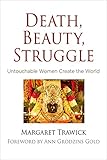Death, Beauty, Struggle : Untouchable Women Create the World / Margaret Trawick.
Material type: TextSeries: Contemporary EthnographyPublisher: Philadelphia : University of Pennsylvania Press, [2017]Copyright date: ©2017Description: 1 online resource (304 p.)Content type:
TextSeries: Contemporary EthnographyPublisher: Philadelphia : University of Pennsylvania Press, [2017]Copyright date: ©2017Description: 1 online resource (304 p.)Content type: - 9780812249057
- 9780812293920
- 305.5/688082095475 23
- online - DeGruyter
- Issued also in print.
| Item type | Current library | Call number | URL | Status | Notes | Barcode | |
|---|---|---|---|---|---|---|---|
 eBook
eBook
|
Biblioteca "Angelicum" Pont. Univ. S.Tommaso d'Aquino Nuvola online | online - DeGruyter (Browse shelf(Opens below)) | Online access | Not for loan (Accesso limitato) | Accesso per gli utenti autorizzati / Access for authorized users | (dgr)9780812293920 |
Frontmatter -- Contents -- Foreword -- Preface -- Introduction -- Chapter 1. Māriamman -- Chapter 2. Sorrow and Protest -- Chapter 3. Work and Love -- Chapter 4. On the Edge of the Wild -- Chapter 5. The Life of Sevi -- Chapter 6. The Song of Siṅgammā -- Conclusion -- Notes -- Glossary of Tamil Words and Phrases -- References -- Index -- Acknowledgments
restricted access online access with authorization star
http://purl.org/coar/access_right/c_16ec
Death, Beauty, Struggle represents a long labor of love and the summation of forty years of Margaret Trawick's groundbreaking research. Centering her gaze on the lowest castes of India, now called Dalits, she describes the experience of women at this precarious level who are still treated as sub-human, sometimes by family members, sometimes by higher-caste men. Their private worlds, however, are full of art; rural Dalit women sing beautiful songs of their own making and tell remarkable narratives of their own lives.Much that Tamil women shared with Trawick is rooted in the passionate attachments and acute wounds generated within families, but these women's voices resonate well beyond individually circumscribed lives. In their songs and life stories they critique social, political, economic, and domestic oppressions. They also incorporate visions of natural beauty and immanent divinity. Trawick presents Tamil women's words as relevant to universal human themes.Trawick's frames of analysis, developed throughout her long career of fieldwork in India, inform her ethnography of expressive culture. The songs and stories of Dalit women were recorded and transcribed, to be translated into lyrical passages in her own work. Death, Beauty, Struggle demonstrates a conviction that persons without privilege-from the rape victim to the landless laborer-possess both power and agency. Through verbal arts, Dalit women produce not only acute cultural critiques but also astonishing beauty.
Issued also in print.
Mode of access: Internet via World Wide Web.
In English.
Description based on online resource; title from PDF title page (publisher's Web site, viewed 26. Aug 2020)


